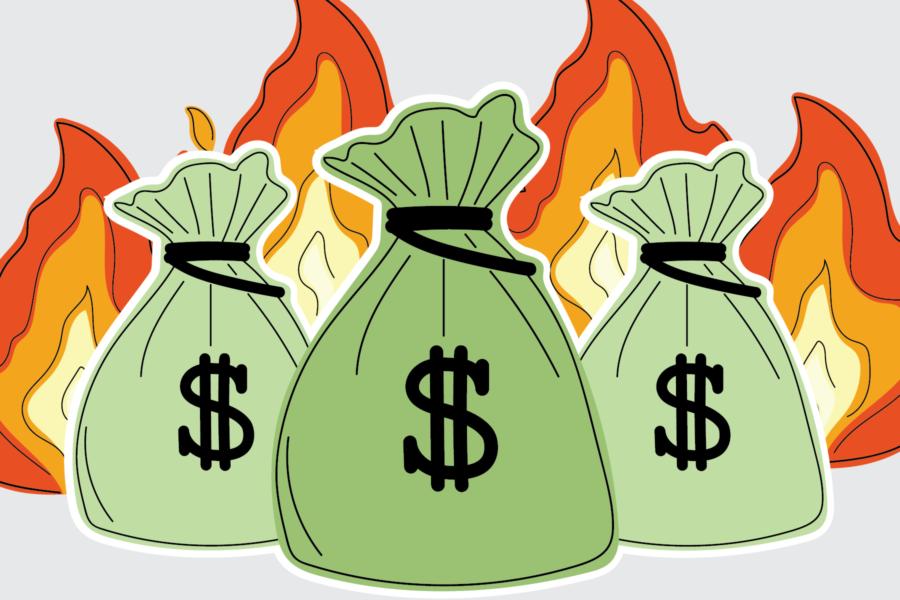The banking world has been in a state of uncertainty as of late. Silicon Valley Bank (SVB), Signature Bank and Credit Suisse all collapsed over the last month, and many people have already begun drawing comparisons to the 2008 housing crisis.
Is this a valid concern? It’s hard to say, and we may not know until months — if not years — from now when we have a full view of the situation.
I’ll try and save you from the in-depth economic examination of the events of 2008, but, essentially, the Federal Reserve decreased interest rates on banks, allowing them to loan out greater amounts of money, even to “high-risk” or “sub-prime” customers.
Often, hundreds of these sub-prime customers were grouped as an odd sort of bond.
Many of these loans were used for purchasing, you guessed it, housing and general property. Housing prices went up, and many people were purchasing houses they couldn’t afford without these loans; as interest rates went up, people defaulted on loans, bonds lost value, loans on houses became more expensive than the houses themselves and banks started going under.
I feel no sympathy for these banks. They dealt in treacherous territory and wouldn’t look past their own noses, dragging everyone else down with them. Plus, they received a hefty bail-out (at the expense of taxpayers, of course), an olive branch not extended to the many contractors, homeowners and average Americans who were far more adversely affected.
The situation now is reminiscent, but not the same as 2008
Our current situation is slightly different. SVB had invested a lot of money into government bonds as interest rates were ridiculously low. Sound familiar? They also worked closely with venture capital firms and invested in fairly volatile industries like tech startups and cryptocurrency.
To combat inflation over the last year, the Federal Reserve hiked interest rates, causing those bonds to become a lot less valuable. These bonds represented a large portion of SVB capital, and their decline was lethal.
This loss in value caused a run on the bank (large waves of withdrawals, eventually exceeding their reserves) and, as SVB collapsed, stock in Signature Bank fell and the bank was shut down.
How was this able to happen? Are other banks soon to follow?
Not all banks are like SVB
The average commercial bank is in a much safer position.
“What I do in the Midwest here in Minneapolis and what [SVB does] are kind of apples and oranges,” said Trevor Bakken, commercial banker for 21st Century Bank.
Bakken deals more in what he refers to as “meat and potatoes” banking, like real estate, brick-and-mortar equipment and lines of credit for businesses.
These banks are by no means infallible, as demonstrated by the aforementioned housing crisis. However, when handled appropriately (as I am confident Bakken does) they are built on much safer markets.
“I’m surprised that more [banks like SVB] don’t go down because of the type of business they’re catering to,” Bakken said. “Tech, it can be volatile. It can be here today and gone tomorrow.”
There is a lot of money to be made in tech. Venture capital loves these startups, but they aren’t always built on concrete earnings.
“A lot of these tech companies don’t actually ever make a profit, or they’re worth billions of dollars and never make money,” Bakken said.
Bakken mentioned how many of these startups are built to find some sort of niche, garner users and sell themselves off to the highest bidder.
In dealing in business that is more abstract than physical buildings and the loans associated with them, banks like SVB expose themselves to a lot of risk.
If more banks in similar ventures start falling to a similar fate, who will be affected by it? How far-reaching will these consequences be?
“When you take a step back and understand all the factors that go into the housing market, you have title companies, you have mortgage people, you have plumbers, electricians, HVAC guys, cement guys, roofers, framers,” Bakken said.
If the tech industry sees some contraction, it appears a very different crowd will be affected. This is not to say that it is inconsequential; more 5 million people are employed in the tech sector and could stand to be majorly affected.
However, more 11 million people are employed in construction alone, not to mention the other aspects of the housing market.
An uncertain future
The ramifications of this will most likely not be as universal as the events of 2008, but it should not be taken lightly. Despite this being localized in the tech sector at the moment, there could be greater ramifications for all.
“I feel like we’re at this moment in time [where we’re wondering] are we in a recession? Are we going into a recession? It feels like we’re in a recession, but are we really in a recession? What do we not know? That’s around the corner,” Bakken said. “What are we not seeing today that a year from now, two years from now, you’re gonna look back with your buddies having a beer and go, ‘Man, how did we miss that?’”
Only time will tell.
“When everything’s going really well, it just keeps chugging along. The second there’s a chink in that armor or something derails just a little bit, the whole thing falls apart. And it falls apart quickly,” Bakken said.
Bakken mentioned that SVB exhibited rapid growth (probably too rapid) in a very short time frame. This involves taking some risks and shying away from more conservative, safe banking practices.
“The right way to do things [is] over a long period of time, it’s not sexy, it’s not going to make you front page of the finance section in any outlet in America,” Bakken said. “But you’re giving your shareholders a good return.”
Not to mention, when you get there more modestly, you probably won’t be found in the headlines of every news outlet in America when it all comes crashing down.












